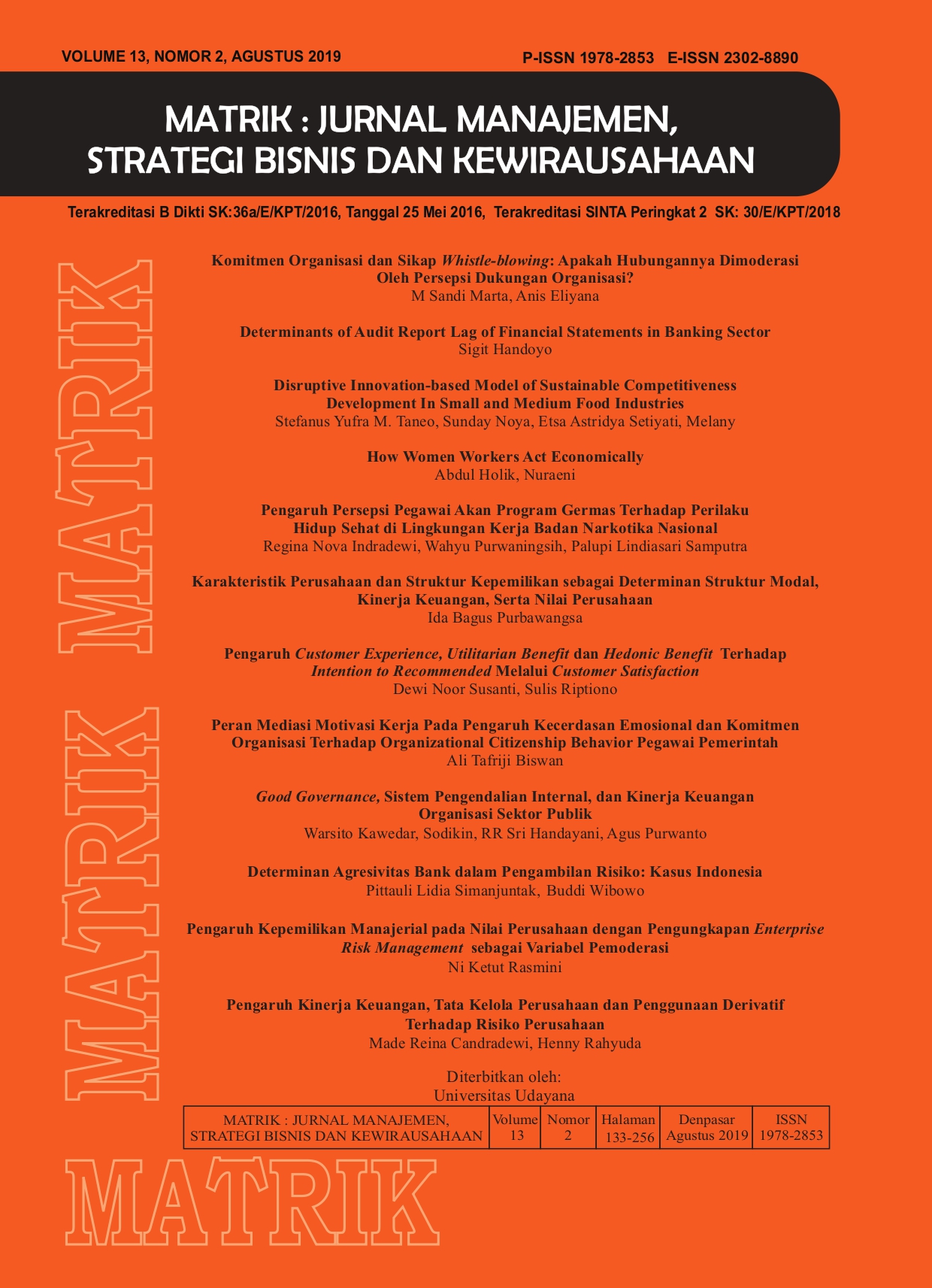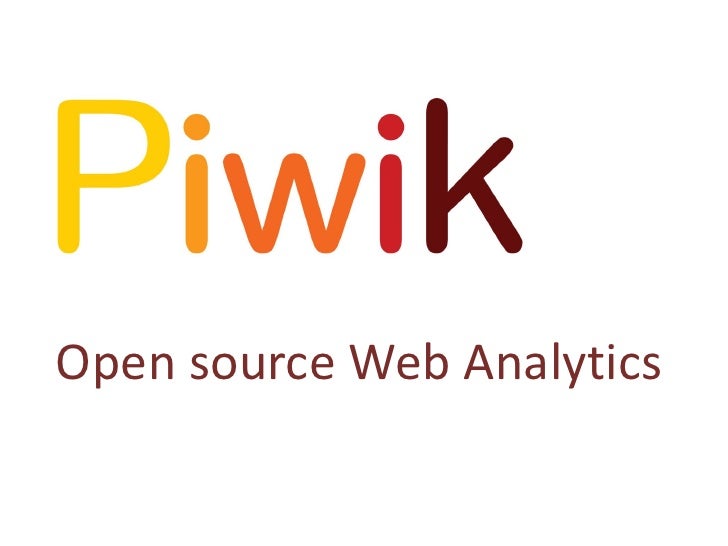Komitmen Organisasi dan Sikap Whistle-Blowing: Apakah Hubungannya Dimoderasi Oleh Persepsi Dukungan Organisasi?
Abstract
The explanation of how individuals do whistle-blowing is actually influenced by interpersonal factors of employees. This article aims to develop an original framework that explains the role of moderating perception of organizational support between organizational commitment and whistle-blowing attitudes. This research is an empirical study at state universities in the city of Bandung with multivariate analysis as a tool in explaining the research hypothesis. The results show that organizational commitment empirically has a positive effect on whistle-blowing attitudes. Furthermore, the perceived organizational support positively moderates the influence between organizational commitment and whistle-blowing attitudes.
Downloads
References
Alleyne, P. (2016). The influence of organisational commitment and corporate ethical values on non-public accountants’ whistle-blowing intentions in Barbados. Journal of Applied Accounting Research, 17(2), 190–210. https://doi.org/10.1108/JAAR-12-2013-0118
Alleyne, P., Charles-Soverall, W., Broome, T., & Pierce, A. (2017). Perceptions, predictors and consequences of whistleblowing among accounting employees in Barbados. Meditari Accountancy Research, 25(2), 241–267. https://doi.org/10.1108/MEDAR-09-2016-0080
Aselage, J., & Eisenberger, R. (2003). Perceived organizational support and psychological contracts: a theoretical integration. Journal of Organizational Behavior, 24(5), 491–509. https://doi.org/10.1002/job.211
Caesens, G., Stinglhamber, F., Demoulin, S., De Wilde, M., & Mierop, A. (2019). Perceived organizational support and workplace conflict: The mediating role of failure-related trust. Frontiers in Psychology, 9(JAN), 1–13. https://doi.org/10.3389/fpsyg.2018.02704
Caillier, J. G. (2013). Transformational Leadership and Whistle-Blowing Attitudes. The American Review of Public Administration, 45(4), 458–475. https://doi.org/10.1177/0275074013515299
Caplan, R. (1987). Person-Environment Fit Theory and Organizations : Commensurate Dimensions , Time Perspectives , and Mechanisms. Journal of Vocational Behavior, 267, 248–267. https://doi.org/10.1016/0001-8791(87)90042-X T4 - Commensurate dimensions, time perspectives, and mechanisms M4 - Citavi
Chong, M. P. M. (2014). Influence behaviors and organizational commitment: A comparative study. Leadership and Organization Development Journal, 35(1), 54–78. https://doi.org/10.1108/LODJ-03-2012-0035
Cropanzano, R., & Mitchell, M. S. (2005). Social exchange theory: An Interdisciplinary review. Journal of Management, 31(6), 874–900. https://doi.org/10.1177/0149206305279602
Eisenberger, R., Buffardi, L. C., Kurtessis, J. N., Stewart, K. A., Ford, M. T., & Adis, C. S. (2015). Perceived Organizational Support: A Meta-Analytic Evaluation of Organizational Support Theory. Journal of Management, 43(6), 1854–1884. https://doi.org/10.1177/0149206315575554
Eisenberger, R., Huntington, R., Hutchison, S., & Sowa, D. (1986). Eisenberger 1986 JAppPsychol POS original article. Journal of Applied Psychology, 71(3), 500–507.
Eisenberger, R., Stinglhamber, F., Vandenberghe, C., Sucharski, I. L., & Rhoades, L. (2002). Perceived supervisor support: Contributions to perceived organizational support and employee retention. Journal of Applied Psychology, 87(3), 565–573. https://doi.org/10.1037/0021-9010.87.3.565
Escobar, A., Trujillo-Martín, M. del M., Rueda, A., Pérez-Ruiz, E., Avis, N. E., & Bilbao, A. (2015). Cross-cultural adaptation, reliability and validity of the Spanish version of the Quality of Life in Adult Cancer Survivors (QLACS) questionnaire: Application in a sample of short-term survivors. Health and Quality of Life Outcomes, 13(1), 1–14. https://doi.org/10.1186/s12955-015-0378-2
Hamid, M. H., & Zainudin, N. (2015). Whistleblowing: an Organizational Support Perspective. International Journal of Management Research & Review, 5(1), 2249–7196. Retrieved from www.ijmrr.com
Helm, R., & Mark, A. (2012). Analysis and evaluation of moderator effects in regression models: State of art, alternatives and empirical example. Review of Managerial Science, 6(4), 307–332. https://doi.org/10.1007/s11846-010-0057-y
Jalilvand, M. R., Vosta, S. N., & Yasini, A. (2017). Motivational Antecedents of Whistle-Blowing in Iranian Public Service Organizations. Iranian Journal of Management Studies, 10(2), 385–408. https://doi.org/10.22059/ijms.2017.214779.672239
Jaros, S. (2007). Meyer and Allen Model of Organizational Commitment. Journal of Organizational Behaviour, IV(4), 7–25. https://doi.org/10.1348/096317906X118685
Kahana, E., Lovegreen, L., Kahana, B., & Kahana, M. (2003). Environment and Behavior INFLUENCES ON RESIDENTIAL SATISFACTION OF ELDERS. Environment and Behavior, 35(3), 434–453. https://doi.org/10.1177/0013916503251447
Kyu Wang, T., Fu, K. J., & Yang, K. (2018). Do Good Workplace Relationships Encourage Employee Whistle-Blowing? Public Performance and Management Review, 41(4), 768–789. https://doi.org/10.1080/15309576.2018.1464935
Lu, Y., Guo, C., Lu, Y., & Gupta, S. (2018). The role of online communication in avoiding perceived restrictiveness of shopping websites: A social learning theory perspective. Nankai Business Review International, 9(2), 143–161. https://doi.org/10.1108/NBRI-11-2017-0063
Maroun, W., & Gowar, C. (2013). South African Auditors Blowing the Whistle without Protection: A Challenge for Trust and Legitimacy. International Journal of Auditing, 17(2), 177–189. https://doi.org/10.1111/j.1099-1123.2012.00463.x
Meyer, J. P., Allen, N. J., & Smith, C. A. (1993). Commitment to Organizations and Occupations : Extension and Test of a. Journal of Applied Psychology, 78(4), 538–551.
Miceli, M. P., Near, J. P., Rehg, M. T., & van Scotter, J. R. (2012). Predicting employee reactions to perceived organizational wrongdoing: Demoralization, justice, proactive personality, and whistle-blowing. Human Relations (Vol. 65). https://doi.org/10.1177/0018726712447004
N. Allen, & J. Meyer. (1990). The measurement and antecedents of affective, continuance and normative commitment to the organization. Journal of Occupational Psychology., 63, 1–18.
Neves, P., & Eisenberger, R. (2014). Perceived organizational support and risk taking. Journal of Managerial Psychology, 29(2), 187–205. https://doi.org/10.1108/JMP-07-2011-0021
Nguyen, T.-M., Nham, P. T., & Hoang, V.-N. (2019). The theory of planned behavior and knowledge sharing. VINE Journal of Information and Knowledge Management Systems, 49(1), 76–94. https://doi.org/10.1108/VJIKMS-10-2018-0086
Rhee, J., & Dedahanov, A. T. (2015). Examining the Relationships among Trust , Silence and Organizational Commitment Introduction. Management Decision, 53(8), 1–19. https://doi.org/10.1108/MD-02-2015-0041
Saud, I. M. (2017). Pengaruh Sikap dan Persepsi Kontrol Perilaku Terhadap Niat Whistleblowing Internal-Eksternal dengan Persepsi Dukungan Organisasi Sebagai Variabel Pemoderasi. Jurnal Akuntansi Dan Investasi, 17(2), 209–219. https://doi.org/10.18196/jai.2016.0056.209-219
Sharma, S., Durand, R. M., & Gur-Arie, O. (1981). Identification and Analysis of Moderator Variables. Journal of Marketing Research, 18(3), 291–300. https://doi.org/10.2307/3150970
Somers, M. J., & Casal, J. C. (2007). Organizational Commitment and Whistle-Blowing. Group & Organization Management, 19(3), 270–284. https://doi.org/10.1177/1059601194193003
Taiwo, S. F. (2015). Effects of Whistle Blowing Practices on Organizational Performance in the Nigerian Public Sector: Empirical Facts from selected Local Government in Lagos & Ogun State. Journal of Marketing and Management, 6(1), 41–61. Retrieved from http://www.gsmi-ijgb.com/Documents/JMM V6 N1 P04 Sunday Felix Taiwo -Effects of Whistle Blowing.pdf
Zakaria, M. (2015). Antecedent Factors of Whistleblowing in Organizations. Procedia Economics and Finance, 28(April), 230–234. https://doi.org/10.1016/s2212-5671(15)01104-1
 This work is licensed under a Creative Commons Attribution-ShareAlike 4.0 International License.
This work is licensed under a Creative Commons Attribution-ShareAlike 4.0 International License.

















